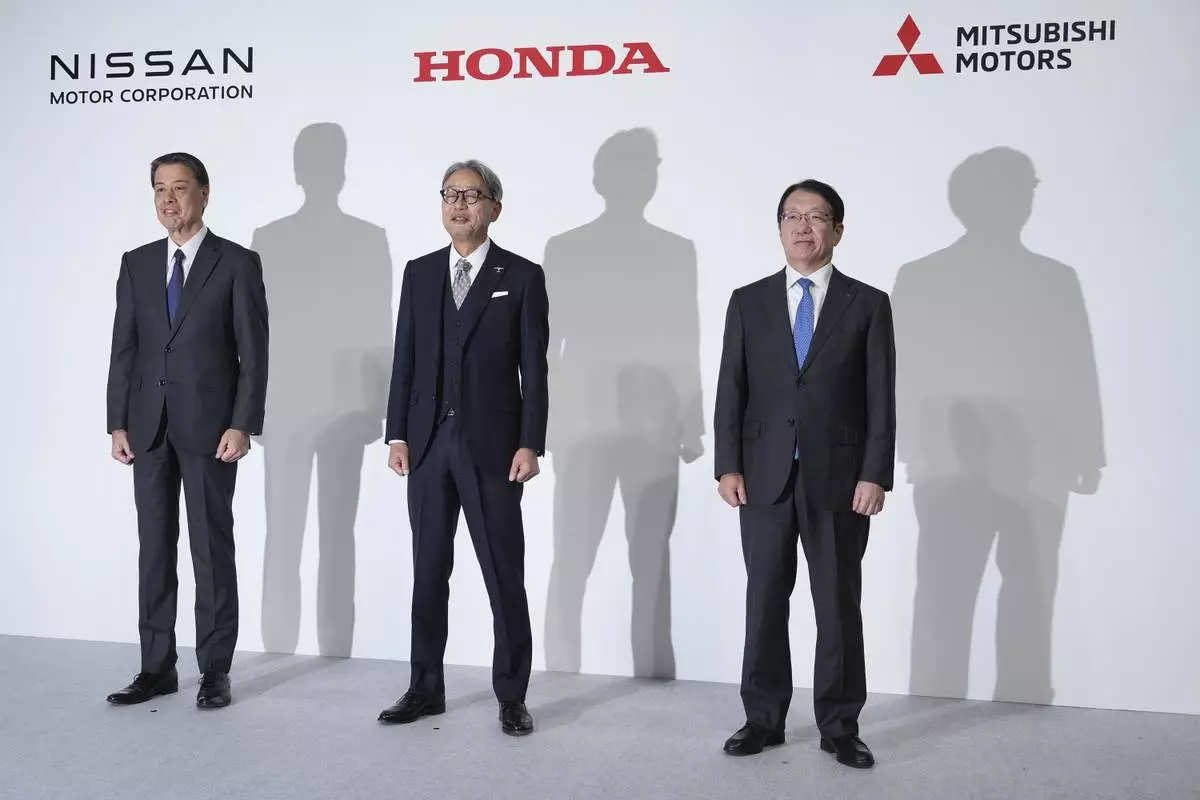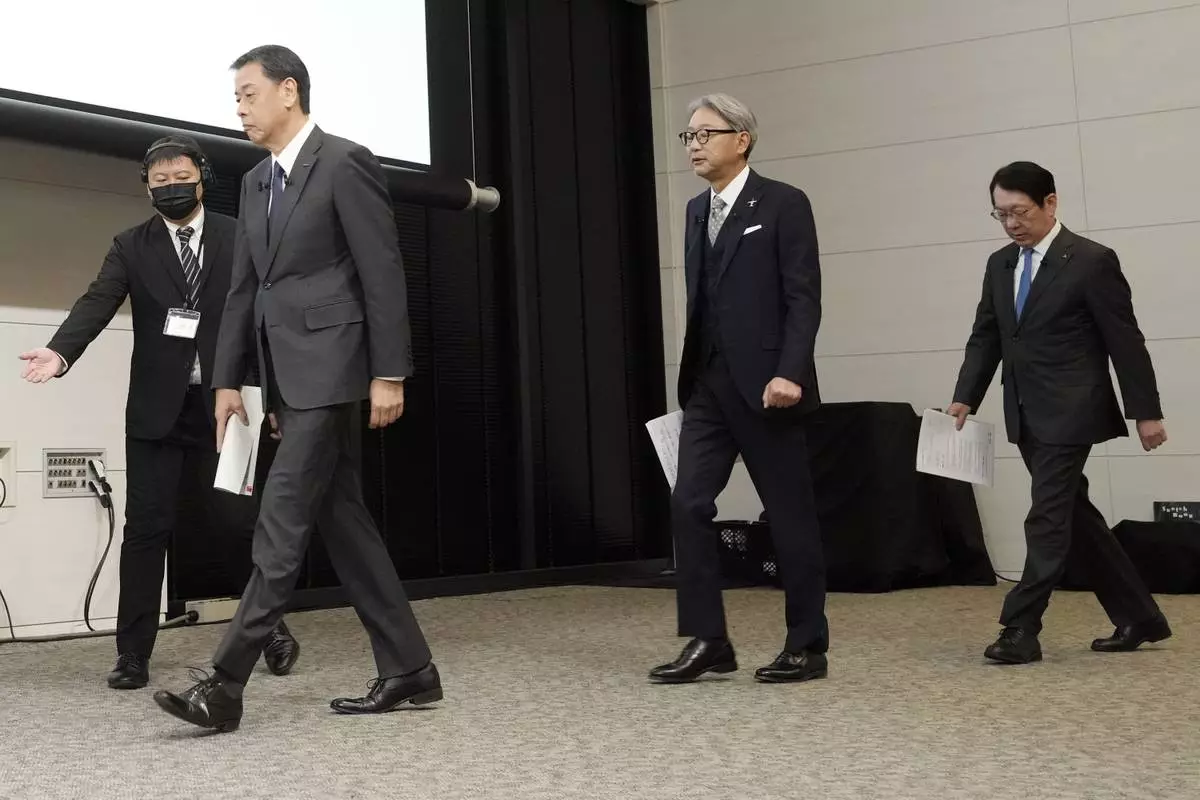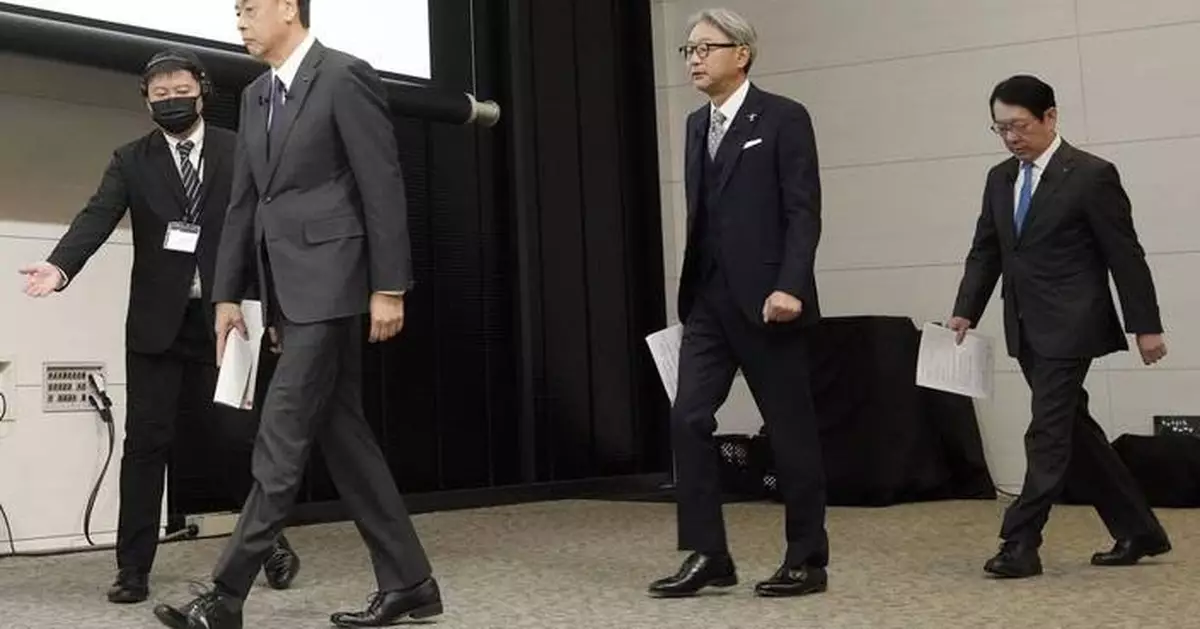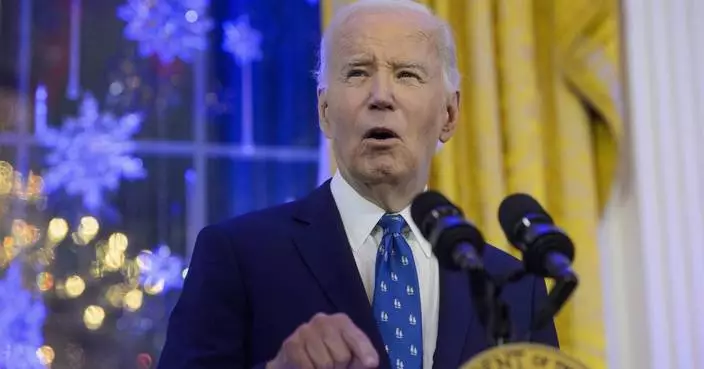BANGKOK (AP) — Japanese automakers Honda and Nissan will attempt to merge and create the world’s third-largest automaker by sales as the industry undergoes dramatic changes in its transition away from fossil fuels.
The two companies said they had signed a memorandum of understanding on Monday and that smaller Nissan alliance member Mitsubishi Motors also had agreed to join the talks on integrating their businesses. Honda will initially lead the new management, retaining the principles and brands of each company.
Following is a quick look at what a combined Honda and Nissan would mean for the companies, and for the auto industry.
The ascent of Chinese automakers is rattling the industry at a time when manufacturers are struggling to shift from fossil fuel-driven vehicles to electrics. Relatively inexpensive EVs from China's BYD, Great Wall and Nio are eating into the market shares of U.S. and Japanese car companies in China and elsewhere.
Japanese automakers have lagged behind big rivals in EVs and are now trying to cut costs and make up for lost time.
Nissan, Honda and Mitsubishi announced in August that they will share components for electric vehicles like batteries and jointly research software for autonomous driving to adapt better to dramatic changes in the auto industry centered around electrification. A preliminary agreement between Honda, Japan's second-largest automaker, and Nissan, third largest, was announced in March.
A merger could result in a behemoth worth about $55 billion based on the market capitalization of all three automakers.
Joining forces would help the smaller Japanese automakers add scale to compete with Japan's market leader Toyota Motor Corp. and with Germany’s Volkswagen AG. Toyota itself has technology partnerships with Japan's Mazda Motor Corp. and Subaru Corp.
Nissan has truck-based body-on-frame large SUVs such as the Armada and Infiniti QX80 that Honda doesn't have, with large towing capacities and good off-road performance, said Sam Fiorani, vice president of AutoForecast Solutions.
Nissan also has years of experience building batteries and electric vehicles, and gas-electric hybird powertrains that could help Honda in developing its own EVs and next generation of hybrids, he said.
“Nissan does have some product segments where Honda doesn’t currently play,” that a merger or partnership could help, said Sam Abuelsamid, a Detroit-area automotive industry analsyt.
While Nissan's electric Leaf and Ariya haven't sold well in the U.S., they're solid vehicles, Fiorani said. “They haven't been resting on their laurels, and they have been developing this technology,” he said. “They have new products coming that could provide a good platform for Honda for its next generation.”
Nissan said last month that it was slashing 9,000 jobs, or about 6% of its global work force, and reducing global production capacity by 20% after reporting a quarterly loss of 9.3 billion yen ($61 million).
Earlier this month it reshuffled its management and its chief executive, Makoto Uchida, took a 50% pay cut to take responsibility for the financial woes, saying Nissan needed to become more efficient and respond better to market tastes, rising costs and other global changes.
Fitch Ratings recently downgraded Nissan's credit outlook to “negative,” citing worsening profitability, partly due to price cuts in the North American market. But it noted that it has a strong financial structure and solid cash reserves that amounted to 1.44 trillion yen ($9.4 billion).
Nissan's share price has fallen to the point where it is considered something of a bargain. A report in the Japanese financial magazine Diamond said talks with Honda gained urgency after the Taiwan maker of iPhones Hon Hai Precision Industry Co., better known as Foxconn, began exploring a possible acquisition of Nissan as part of its push into the EV sector.
The company has struggled for years following a scandal that began with the arrest of its former chairman Carlos Ghosn in late 2018 on charges of fraud and misuse of company assets, allegations that he denies. He eventually was released on bail and fled to Lebanon.
Honda reported its profits slipped nearly 20% in the first half of the April-March fiscal year from a year earlier, as sales suffered in China.
Toyota made 11.5 million vehicles in 2023, while Honda rolled out 4 million and Nissan produced 3.4 million. Mitsubishi Motors made just over 1 million. Even after a merger Toyota would remain the leading Japanese automaker.
All the global automakers are facing potential shocks if President-elect Donald Trump follows through on threats to raise or impose tariffs on imports of foreign products, even from allies like Japan and neighboring countries like Canada and Mexico. Nissan is among the major car companies that have adjusted their supply chains to include vehicles assembled in Mexico.
Meanwhile, analysts say there is an “affordability shift” taking place across the industry, led by people who feel they cannot afford to pay nearly $50,000 for a new vehicle. In American, a vital market for companies like Nissan, Honda and Toyota, that's forcing automakers to consider lower pricing, which will eat further into industry profits.
AP Auto Writer Tom Krisher contributed to this report from Detroit.

Nissan Chief Executive Makoto Uchida, left, Honda Chief Executive Toshihiro Mibe, center, and Takao Kato, CEO of Mitsubishi Motors, right, pose for photographers during a joint news conference in Tokyo, Japan, Monday, Dec. 23, 2024. (AP Photo/Eugene Hoshiko)

Nissan Chief Executive Makoto Uchida, left, and Honda Chief Executive Toshihiro Mibe, center, and Takao Kato CEO of Mitsubishi Motors, right, arrive to attend a joint news conference Monday, Dec. 23, 2024, in Tokyo, Japan. (AP Photo/Eugene Hoshiko)
HENDERSON, Nev.--(BUSINESS WIRE)--Dec 23, 2024--
Zura Bio Limited (Nasdaq: ZURA) (“Zura Bio”), a clinical stage, multi-asset immunology company developing novel dual-pathway antibodies for autoimmune and inflammatory diseases, today announced the launch of TibuSURE, a Phase 2 global study evaluating tibulizumab for the treatment of systemic sclerosis (SSc) in adults.
This press release features multimedia. View the full release here: https://www.businesswire.com/news/home/20241223167603/en/
"Single-pathway inhibition has demonstrated modest effects in rheumatic diseases like SSc. This is why we believe tibulizumab's dual-pathway approach holds the potential to be best-in-class, aiming to provide deeper efficacy and greater benefits for patients affected by this life-threatening autoimmune disease,” said Kiran Nistala, MBBS, PhD, Chief Medical Officer and Head of Development at Zura Bio. “The initiation of the TibuSURE study marks a significant milestone in addressing certain urgent, unmet needs of this patient population and advancing our mission to improve the lives of those affected by autoimmune and inflammatory conditions."
“Systemic sclerosis is a heterogeneous and complex autoimmune disease characterized by both inflammatory and fibrotic processes, for which effective therapies remain limited,” said Christopher Denton, PhD, FRCP, FMedSci, Professor of Experimental Rheumatology at the University College London and Consultant Rheumatologist and Head of the Centre for Rheumatology at the Royal Free Hospital, London. “Tibulizumab’s dual-targeting mechanism offers a novel strategy by concurrently targeting two pivotal pathways involved in inflammation and fibrosis. This mechanism holds the potential to address the multi-organ pathology of SSc and help improve the lives of patients with SSc.”
ABOUT TibuSURE
TibuSURE is a global Phase 2 double-blind, placebo-controlled study evaluating the safety, tolerability, and efficacy of tibulizumab in approximately 80 participants with early diffuse cutaneous systemic sclerosis (dcSSc). The study includes a 24-week efficacy period and a 28-week open-label extension (OLE). The primary endpoint is the modified Rodnan Skin Score (mRSS), with key efficacy endpoints including lung disease assessed by quantitative high-resolution computed tomography (qHRCT) and forced vital capacity (FVC), physical function measured by the Health Assessment Questionnaire-Disability Index (HAQ-DI), and the revised Combined Response Index in Systemic Sclerosis (rCRISS).
ABOUT SYSTEMIC SCLEROSIS
Systemic sclerosis (SSc), also known as scleroderma, is a rare, life-threatening autoimmune disease affecting approximately 300,000 individuals worldwide, including around 100,000 in the United States. Characterized by chronic inflammation and progressive fibrosis of connective tissues, SSc primarily affects the skin and lungs but can also impact the heart, liver, kidneys, digestive tract, and vascular system. The most common symptoms of SSc include skin thickening and extreme sensitivity to cold in the extremities. The disease can also affect other organs and tissues, leading to muscle numbness and swelling, joint stiffness and reduced mobility, fibrosis in the lungs and heart, kidney dysfunction, and gastrointestinal issues such as difficulty swallowing, heartburn, bloating, constipation, and diarrhea.
There remains a high unmet medical need due to the limited treatment options available for individuals living with SSc. Currently, only two disease-modifying therapies are FDA-approved for severe lung complications of the disease (i.e., SSc-ILD), and no effective treatment exists that addresses the disease across multiple organ systems.
ABOUT TIBULIZUMAB
Tibulizumab, an investigational humanized, tetravalent bispecific dual-antagonist antibody, is a fusion of Taltz® (ixekizumab) and tabalumab, engineered to bind to and neutralize both IL-17A and BAFF. Tibulizumab is currently being evaluated in a Phase 2 study in adults with systemic sclerosis and is expected to enter Phase 2 clinical development for the treatment of hidradenitis suppurativa in Q2 2025. Before in-licensing, Phase 1/1b studies of tibulizumab were conducted in Sjögren’s syndrome and rheumatoid arthritis. Tibulizumab is an investigational compound that is not approved for marketing by the FDA or any other regulatory authority.
ABOUT ZURA BIO
Zura Bio is a clinical-stage, multi-asset immunology company developing novel dual-pathway antibodies for autoimmune and inflammatory diseases. Currently, Zura Bio is developing three assets which have completed Phase 1/1b studies. The company is developing a portfolio of therapeutic indications for tibulizumab (ZB-106), crebankitug (ZB-168), and torudokimab (ZB-880), with a goal of demonstrating their efficacy, safety, and dosing convenience in autoimmune and inflammatory diseases, including systemic sclerosis and other novel indications with unmet needs.
FORWARD-LOOKING STATEMENTS
This communication includes “forward-looking statements” within the meaning of the “safe harbor” provisions of the Private Securities Litigation Reform Act of 1995. Words such as “expect,” “estimate,” “project,” “budget,” “forecast,” “anticipate,” “intend,” “plan,” “may,” “will,” “could,” “should,” “believe,” “predict,” “potential,” “continue,” “strategy,” “future,” “opportunity,” “would,” “seem,” “seek,” “outlook,” “goal,” “mission,” and similar expressions are intended to identify such forward-looking statements. Forward-looking statements are predictions, projections and other statements about future events that are based on current expectations and assumptions and, as a result, are subject to risks and uncertainties that could cause the actual results to differ materially from the expected results. These statements are based on various assumptions, whether or not identified in this communication. These forward-looking statements in this release include, but are not limited to, statements regarding: the potential of tibulizumab's dual-pathway approach to be best-in-class and to provide deeper efficacy and greater benefits for patients affected by SSc; the ability of tibulizumab to address certain unmet needs and improve the lives of patients with SSc; and expectations with respect to Zura Bio’s development program, including regulatory matters, clinical trials and the design and timing thereof. These forward-looking statements are provided for illustrative purposes only and are not intended to serve as, and must not be relied on by an investor as, a guarantee, an assurance, a prediction or a definitive statement of fact or probability.
Actual events are difficult or impossible to predict and could differ materially from those expressed or implied in such forward-looking statements, as a result of these risks and uncertainties, which include, but are not limited to: Zura Bio’s expectations regarding its product candidates and their related benefits, and Zura Bio’s beliefs regarding competing product candidates and products both in development and approved, may not be achieved; Zura Bio's vision and strategy may not be successful; the timing of key events and initiation of Zura Bio's studies, regulatory matters and release of clinical data may take longer than anticipated or may not be achieved at all; the potential general acceptability and maintenance of Zura Bio's product candidates by regulatory authorities, payors, physicians, and patients may not be achieved; Zura Bio's ability to attract and retain key personnel; Zura Bio's expectations with respect to its future operating expenses, capital requirements and needs for additional financing may not be achieved; Zura Bio has not completed any clinical trials, and has no products approved for commercial sale; Zura Bio has incurred significant losses since inception, and expects to incur significant losses for the foreseeable future and may not be able to achieve or sustain profitability in the future; Zura Bio requires substantial additional capital to finance its operations, and if it is unable to raise such capital when needed or on acceptable terms, Zura Bio may be forced to delay, reduce, and/or eliminate one or more of its development programs or future commercialization efforts; Zura Bio may be unable to renew existing contracts or enter into new contracts; Zura Bio relies on third-party contract development manufacturing organizations for the manufacture of clinical materials; Zura Bio relies on contract research organizations, clinical trial sites, and other third parties to conduct of its preclinical studies and clinical trials; Zura Bio may be unable to obtain regulatory approval for its product candidates, and there may be related restrictions or limitations of any approved products; Zura Bio may be unable to successfully respond to general economic and geopolitical conditions; Zura Bio may be unable to effectively manage growth; Zura Bio faces competitive pressures from other companies worldwide; Zura Bio may be unable to adequately protect its intellectual property rights; and other factors set forth in documents filed, or to be filed by Zura Bio, with the Securities and Exchange Commission (SEC), including the risks and uncertainties described in the “Risk Factors” section of Zura Bio's Annual Report on Form 10-K for the year ended December 31, 2023 and other filings with the SEC. These risks and uncertainties may be amplified by health epidemics or other unanticipated global disruption events, which may continue to cause economic uncertainty. Zura Bio cautions that the foregoing list of factors is not exclusive or exhaustive and not to place undue reliance upon any forward-looking statements, which speak only as of the date made. Zura Bio gives no assurance that it will achieve its expectations. Zura Bio does not undertake or accept any obligation to update any forward-looking statements, except as required by law.


Phase 2 TibuSURE study will evaluate tibulizumab in adults with systemic sclerosis (SSc). (Graphic: Business Wire)












